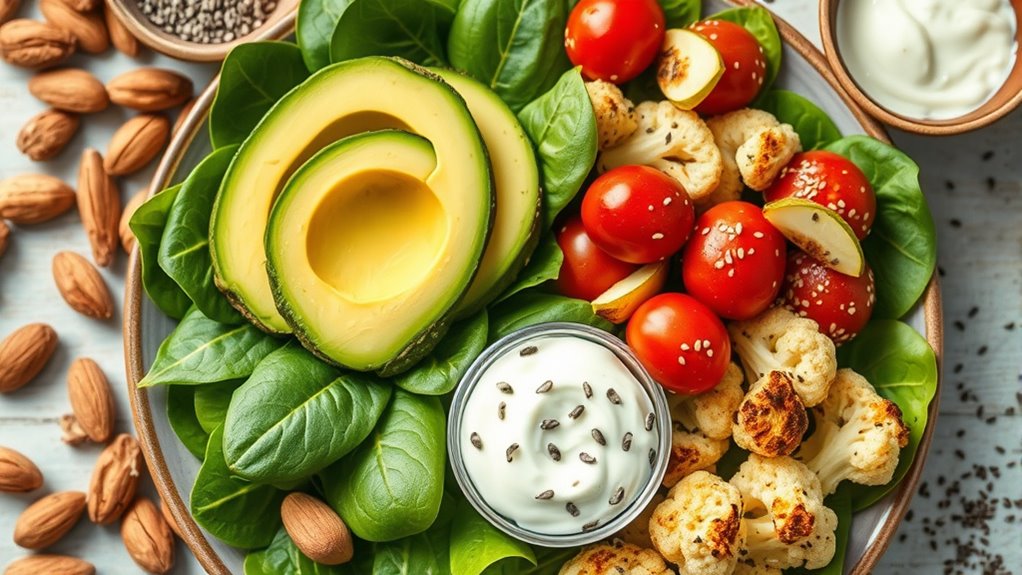To go vegan keto, focus on incorporating plant-based proteins like hemp and chia seeds, while limiting high-carb foods like legumes. Fill your plate with low-carb vegetables such as leafy greens and cruciferous veggies, and boost your fat intake with avocados, coconut oil, and olive oil. Track your macros carefully to stay in ketosis and make sure you’re meeting nutritional needs. Keep exploring for more tips on maintaining balance and variety on your vegan keto journey.
Key Takeaways
- Incorporate plant-based proteins like hemp, chia, and almonds while moderating higher-carb legumes such as lentils and chickpeas.
- Prioritize low-carb vegetables like leafy greens, broccoli, and cauliflower to meet micronutrient needs without disrupting ketosis.
- Use healthy plant fats like avocado, coconut oil, and MCT oil to boost fat intake and support energy levels.
- Track macros carefully to maintain carbohydrate limits and ensure a balanced intake of fats, proteins, and fiber.
- Plan creative, nutrient-dense meals such as salads, stir-fries, and smoothies to sustain variety and motivation.

Have you ever wondered if you can enjoy the benefits of a ketogenic diet while sticking to a vegan lifestyle? The good news is, it’s entirely possible to combine these two approaches by focusing on plant-based options that are high in healthy fats and low in carbs. Your first step is to identify sources of plant-based protein that fit within a keto framework. Think beyond tofu; incorporate nuts, seeds, and legumes in moderation, such as hemp seeds, chia seeds, and almonds. These not only provide essential amino acids but also boost your fat intake, helping you stay in ketosis. Remember, moderation is key with legumes like lentils and chickpeas, as they contain more carbs, but small portions can still work if balanced carefully.
Next, optimize your vegetable choices. The key is to select keto-friendly vegetables that are low in net carbs but rich in nutrients. Leafy greens like spinach, kale, and arugula are excellent choices, offering fiber and vitamins without knocking you out of ketosis. Cruciferous vegetables such as broccoli, cauliflower, and Brussels sprouts are also great because they’re nutrient-dense and low in carbs. Incorporating nutrient-dense vegetables into your meals regularly can add variety and essential nutrients. To enhance your diet further, consider incorporating plant-based fats, which are vital for maintaining ketosis and supporting overall health. You can sauté them in healthy oils like coconut or olive oil, which also help increase your fat intake. Including ketogenic dietary principles can help keep your meal planning consistent and effective.
Using macronutrient tracking can help you stay within your carbohydrate limits and ensure you’re meeting your nutritional goals. Remember, the goal is to fill your plate with vegetables that support ketosis while providing fiber and antioxidants.
To make your vegan keto meal plan enjoyable and sustainable, focus on balancing your intake of healthy fats, plant-based proteins, and keto-friendly vegetables. Use avocado generously—it’s a fantastic source of monounsaturated fats and adds creaminess to salads and smoothies. Coconut oil and MCT oil are other excellent options to enhance fat intake and support energy levels. When cooking, avoid high-carb ingredients and opt for herbs and spices to flavor your dishes without adding carbs. Be mindful of portion sizes, especially with higher-carb plant foods, and track your macros to stay within your desired carbohydrate limits. Incorporating mindful attention to your creative practice can help maintain motivation and reduce stress during this dietary transition.
Incorporating these elements into your daily meals makes it possible to enjoy a variety of delicious, satisfying vegan keto dishes. You can prepare hearty salads topped with nuts and seeds, stir-fries loaded with keto vegetables, or creamy smoothies using coconut milk and avocado. With careful planning, you’ll find that maintaining a vegan keto lifestyle is not only feasible but also rewarding, giving you the health benefits of ketosis while honoring your ethical commitments.
Frequently Asked Questions
Can Vegans Get Enough Protein on a Keto Diet?
You can absolutely get enough protein on a vegan keto diet by focusing on plant-based proteins and diverse amino acid sources. Incorporate foods like tempeh, tofu, seitan, and nuts, which are rich in protein and healthy fats. Combining different plant foods guarantees you get all essential amino acids, so you stay nourished. With mindful planning, you’ll meet your protein needs without sacrificing your plant-based lifestyle.
Are There Vegan Keto-Friendly Snacks Available?
Imagine craving a crunchy, satisfying snack that fuels your keto journey without breaking your plant-based promises. You’ll find vegan keto-friendly options like plant-based nuts and seed-based snacks that fit seamlessly into your diet. These snacks offer healthy fats and protein, satisfying your hunger while keeping carbs low. Whether it’s roasted almonds or seed crackers, you can enjoy guilt-free, keto-compatible treats that support your vegan lifestyle and keto goals.
How Do I Balance Carbs and Fats Vegan Keto?
To balance carbs and fats, you need to focus on carbohydrate control and fat intake strategies. Limit high-carb plant foods like grains and starchy vegetables, and include healthy fats from avocados, nuts, seeds, and coconut oil. Track your intake to stay within your keto goals, ensuring you get enough fats to fuel your body while keeping carbs low. This approach helps you maintain ketosis while following a vegan diet.
Is Vegan Keto Suitable for Athletes?
You’re asking if vegan keto can fuel plant-based endurance athletes. It can work if you prioritize vegan supplement strategies to meet your protein and nutrient needs, and carefully balance carbs and fats. While it’s a challenging diet, some athletes thrive on it, feeling unstoppable. Just remember, with proper planning, you can power through your workouts and stay energized without sacrificing your plant-based lifestyle.
What Are Common Nutritional Deficiencies in Vegan Keto?
You might face nutrient gaps on a vegan keto diet, making it common to have deficiencies in B12, iron, omega-3 fatty acids, and vitamin D. To address these supplement needs, you should consider taking B12 and vitamin D supplements, consuming algae-based omega-3s, and eating fortified foods. Monitoring your nutrient intake helps prevent deficiencies, ensuring your diet remains balanced and supports your overall health and energy levels.
Conclusion
Beginning a vegan keto journey is like navigating a lush jungle—you’ll discover vibrant, new flavors at every turn. Stay curious, listen to your body, and embrace the variety of plant-based fats and proteins available. With patience and creativity, you’ll find your rhythm and flourish in this green, energetic adventure. Remember, every step you take is like planting a seed for a healthier, more vibrant you—keep moving forward, and watch your vitality grow.









